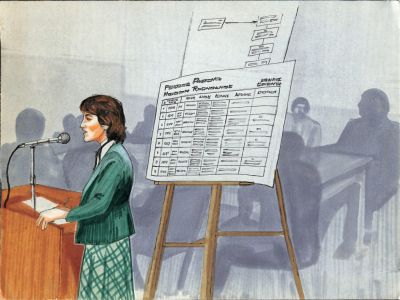Trailblazing Judge Donna Congeni Fitzsimmons has retired from over 40 years of a professional life dedicated to fighting crime and improving her community through judicial service and civic involvement. As judge of the Rocky River, Ohio Municipal Court, which encompasses five western municipalities in the Greater Cleveland area, Judge Fitzsimmons has sought to bring an understanding of the justice system to local schools and launched numerous educational programs over the years to enhance young people’s civic knowledge and understanding of the rule of law.
In her early years of practice, though, she gained local and national prominence as a fierce federal prosecutor who led the Northern Ohio Organized Crime Strike force in the early 1980s. Her prosecution of organized crime figure Angelo Lonardo in 1983 led to her work being memorialized in a permanent exhibit at the National Museum of Organized Crime in Las Vegas. Accolades from the U.S. Department of Justice resulting from her trial victories opened doors for her that eventually led to appointment as Deputy Counsel of the President’s Commission on Organized Crime under President Ronald Reagan from 1983-85.
Judge Fitzsimmons’ early days of prosecuting organized crime figures were groundbreaking for women. She was the only woman on her team when she prosecuted the case against Lonardo. Being either the only woman, or one of a few women, was not a daunting experience for Judge Fitzsimmons. She says she “felt comfortable working with men”, as a result of being raised with three brothers. From childhood, she said “I had very easy conversations with men. I knew everything about sports from my brothers” who all went on to become successful physicians. Consequently, she said, “I appeared nonthreatening to men, and in navigating the world of men I learned that male psyche.”
Italian values also contributed to her professional formation: “Every night we had dinner together as a family and I learned how to work with men.” Her parents were first generation Italian Americans, and of her childhood growing up with Italian immigrant grandparents, she “had the most beautiful life.”
The role of Judge Fitzsimmons’ father in her professional life was perhaps the key to her success. Her father, Leo Congeni, was the carpenter for Cleveland’s Justice Center and he often brought her to work with him when she was a youngster. Judge Fitzsimmons’ early experiences with her father at the Justice Center exposed her to the court system, lawyers and eventually a summer job in the Sheriff’s Department when she was a teenager. Her father encouraged her to pursue law and she realized that she, too, wanted to be a litigator when she grew up.
Prior to her work as an Assistant U.S. Attorney in the Northern District of Ohio, Judge Fitzsimmons worked as an Assistant County Prosecutor in Cuyahoga County. At the time she was one of five female prosecutors among 100 males. “They thought we [women] would do appellate work, but [then-County Prosecutor] J.T. Corrigan said we could do jury trials and so we worked hard; they quickly realized that women did very well with juries.” Her resilience and courtroom experience at the county level gave her the credentials she needed to take her career to the next level in the U.S. Attorney’s Office where she sought out organized crime and public corruption cases which, she said, were “more difficult to prosecute. It was a great challenge. I was among the first women in that office”, as well.
Prosecuting tough federal cases was a niche for which Judge Fitzsimmons was well-suited. A Cum Laude graduate of The George Washington Law School, it seemed a natural progression for her to accept the position with the President’s Commission on Organized Crime: “I went to law school in Washington DC and there were Organized Crime Strike Forces in major cities throughout the U.S. I was able to connect with attorneys all over the country” who were involved in cases either linked or closely aligned with her prosecutorial work at the federal level.
After nearly three years in Washington, she returned home to Cleveland to litigate civil cases as partner with Arter & Hadden, now Tucker Ellis, prior to seeking the bench. She married business litigation attorney Matthew Fitzsimmons who is originally from Staten Island, NY and who himself grew up surrounded by Italians. The couple have been married for 37 years and have three children and two grandchildren. They recently appeared in a podcast for the Cleveland Metropolitan Bar Association as part of the CMBA’s Legacy 150 campaign, celebrating the CMBA’s 150th Anniversary, in which they shared highlights of their fulfilling careers, marriage, and community involvement. Judge Fitzsimmons continues to be active in Italian American organizations in the Greater Cleveland area and serves as an Honorary Trustee of the Justinian Forum, among many other public service-oriented endeavors.



